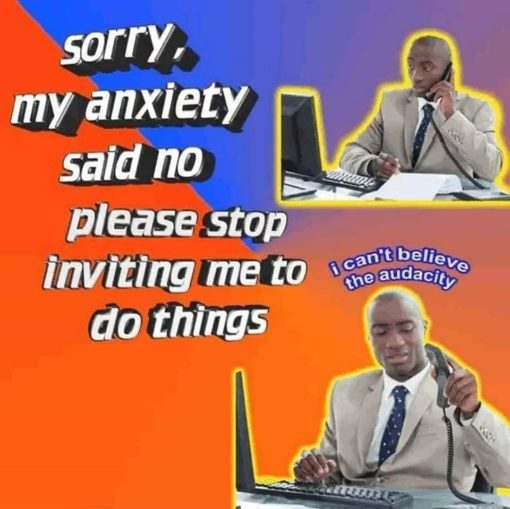sorry my anxiety said no please stop inviting me to
The image in question is a two-panel comic featuring the same character engaged in an exaggerated phone conversation sequence. The backdrop is colorful with blue and orange hues, and the text is displayed in a bold, white font on a black shadow that contrasts sharply with the background, making it prominent and easy to read.
In the top panel, the character is seated behind what appears to be an office desk, holding a phone to his ear with one hand while the other hand is on the keyboard, suggesting he was in the middle of working when the call came in. Accompanying this scene is the text "sorry, my anxiety said no please stop inviting me to do things," humorously portraying the character as if he's relaying a message from his anxiety as though it were a separate entity that has control over his decisions.
In the bottom panel, the scene shifts slightly to show the character in a more relaxed posture, with one hand on his forehead and a mild look of exasperation or disbelief. This time, the text next to him reads "i can't believe the audacity," which implies that the character is offended or taken aback by whoever is on the other end of the line — the very person presumably inviting him to events or activities.
The humor in this image lies in the relatable exaggeration of social anxiety and introversion. Many people experience anxiety or discomfort about being invited to social events, and this meme anthropomorphizes anxiety into a decision-maker that can simply refuse invitations on someone's behalf. The character's dramatic response parodies how overwhelming such invitations can feel to someone dealing with anxiety.
Another layer of humor comes from the character's indignant reaction in the second panel, which is a comical overstatement of the offense taken at being invited to do things. This is amusing because it inverts the usual social expectation that one should feel grateful or happy to be included, instead expressing shock at the "audacity" of the inviter.
Lastly, the meme might be funny to people who use humor as a way to cope with or communicate about their own anxiety. By framing it in a humorous and slightly absurd way, it becomes a shared joke that others who feel the same can understand and appreciate. It can help in normalizing conversations about mental health issues by adding a touch of levity to the discussion. sorry my anxiety said no please stop inviting me to do things i can t believe the audacity
